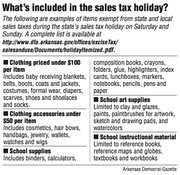Consumers in the state, particularly parents preparing to send children back to school, will not have to pay sales taxes on numerous items -- including shoes, backpacks and pencils -- during this weekend's sales tax holiday.
"It is a state-sanctioned encouragement of people to go shopping," said Kathy Deck, director of the Center for Business and Economic Research at the University of Arkansas at Fayetteville.
Sales tax holidays in Arkansas began in 2011 with the enactment of Act 757. The act sets the annual holiday for the first Saturday and Sunday in August. During that period, no state and local sales and use taxes are collected on clothing priced under $100 and clothing accessories priced under $50, plus certain school supplies, art supplies and instructional materials, such as globes and textbooks.
Arkansas is among 16 states offering sales tax holidays this year that are aimed at families preparing for the start of the school year, though the items that are tax-free differ from state to state.
The tax-free weekend in Arkansas is not limited to items for school. The list of tax-free items includes diapers, baby receiving blankets, steel-toed shoes and wedding apparel that falls within the guidelines.
The sales tax holidays offered in surrounding states led Arkansas lawmakers to adopt the sales tax holiday, Deck said. They were concerned that retailers in surrounding states with sales tax holidays had advantages over retailers in Arkansas, especially in cities close to state borders.
In Oklahoma, the sales tax holiday planned for Friday through Sunday applies to clothing and shoes under $100.
In Missouri, the sales tax holiday Friday through Sunday applies to clothing under $100, computers under $3,500 and school supplies under $50. Unlike Arkansas and Oklahoma, Missouri does not collect state sales taxes during that time period, but cities, counties and other taxing districts in Missouri can choose whether to or not.
Deck said retailers often take advantage of the state promotion of the sales tax holiday, and offer additional discounts and promotions to attract shoppers.
Research on the impact of store sales during sales tax holidays is difficult because of a lack of publicly available data, Deck said.
Adam Cole, who graduated with degrees in economics from the University of Arkansas and is now an economist at the U.S. Department of Treasury, explored the impact of state sales tax holidays in three papers written for his doctoral dissertation in economics at the University of Michigan.
For his dissertation, Cole used data from the 2007 purchases of computers nationwide to evaluate the impact of sales tax holidays on computer purchases. At the time, nine states included computer purchases in their sales tax holidays.
Cole continues to revise his work, but he found that computer prices fell during sales tax holidays, indicating that consumers benefit, he said.
He found that purchases of computers spiked during sales tax holiday periods, similar to spikes during Black Friday in November, he said.
He said he found a spike in computer purchases in August 2007 primarily because people waited for the tax-free holiday to make those purchases. Some of the sales of computers would not have happened if the sales tax holiday had not taken place, he said.
Sales tax holidays are designed to make returning to school more affordable for families, but they also are intended to spur the economy, said Lars Perner, a psychologist who is an assistant professor of clinical marketing at the University of Southern California in Los Angeles. He studies the hows and whys of consumers' decisions.
"A lot of people are driven by the idea of beating the system," Perner said. "That could influence them to buy more."
Whether consumers save money during sales tax holidays depends on their purchases, Perner said.
"You save money on the necessities you buy," he said. "The question is if it causes you to buy things you wouldn't have bought [otherwise]."
Most people end up doing the latter, which causes them to spend more, Perner said.
In 2011, the state Department of Finance and Administration estimated that the sales tax holiday would result in a loss of $2.1 million in state sales tax revenue, said John Shelnutt, administrator for the department's economic analysis and tax research. It's a small amount considering the total sales tax revenue the state receives annually.
Between July 1, 2011, and June 30, 2012, the state received more than $2.8 billion in sales tax revenue when the total state sales tax rate was 6 percent, Shelnutt said. The total state sales tax rate currently is 6.5 percent, with the additional 0.5 percent going to state highways.
In the fiscal year that ended June 30, the total amount of state sales tax revenue collected was $3.1 billion, with $223.4 million collected for highways, he said.
The department does not have statistics on the continued impact of the sales tax holiday because retailers are not required to report their sales activity during the two-day period, department spokesman Roberta Overman said. Retailers report the total amount of taxable sales on a monthly basis rather than daily.
Metro on 07/31/2014

